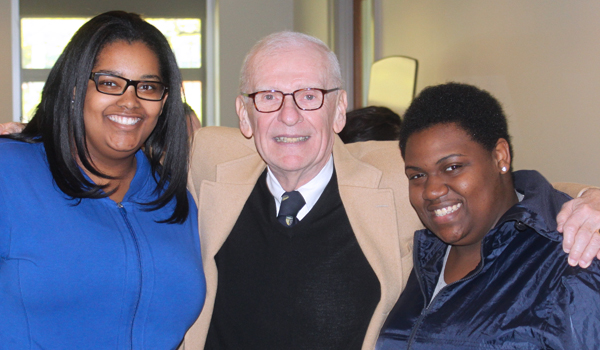 The faculty at Catholic Law is comprised of educators dedicated to teaching, scholarship, and service. They are experts in their fields and dedicated to providing a connected, focused, and practical legal education.
The faculty at Catholic Law is comprised of educators dedicated to teaching, scholarship, and service. They are experts in their fields and dedicated to providing a connected, focused, and practical legal education.
For Professor George P. Smith, that means bridging his scholarly interests with his teaching to provide students with opportunities to see law in action. “Reading cases and then testing the rules deriving from them in ‘the marketplace of ideas’ (i.e. life), is the best way to teach and to understand what law is, and at the same time, learn ways to make law more adaptive to efforts to work toward the achievement of a level of social justice in contemporary society.”
Smith’s legal interests were stoked by the world around him—particularly by his father and uncle, both of whom were practicing members of the Indiana Bar, by the natural beauty of his childhood in Indiana, and a property law course he took early in his own law school career at Indiana University. Smith then applied his interests in a practical way. “In my early career, I worked in the Environmental Law and Enforcement area when I was a Special Counsel at the EPA in Washington, D.C. And, I received further ‘hands on’ experience in land use and environmental law when I advised Governor Winthrop Rockefeller on multiple issues of environmental management for two years. My interest in Law, Science, and Medicine—now referred to commonly as Bioethics—began as a consequence of an article I read in TIME Magazine, around 1964, about the use of artificial insemination in animal husbandry and the ‘thought’ that this process might be available to humans as an aid in assisted reproduction for married couples who were having fertility issues in conceiving. Thereupon, I began to undertake research in the present and emerging law of artificial insemination. I subsequently prepared that research for law review publication and the Michigan Law Review, published it in 1968. In 1973, the article was cited by the U.S. Supreme Court in the case of Roe v. Wade.”
Smith joined the Catholic Law faculty in 1977 and in his 39 year career at the school he has taught courses in property law, land use environmental law, bioethics, and health law—utilizing experience in these specialization areas to enhance his teaching style. Smith shared, “My scholastic interests led me to the idea that I might be able to share and educate others who had a like interest in these areas. Scholarship, then, was my bridge to teaching. And, some have said that without this bridge, one cannot hope to be an effective teacher. In essence, what I am doing as a teacher, then, is sharing my scholarship with my students. Class discussions would provide me with insights into the subject areas that needed to be refined and to which closure could be accomplished. I could present students with ‘real life’ applications of law. On a regular basis, the New York Times and the Washington Post would provide contemporary examples of what Dean Roscoe Pound of Harvard termed ‘legal realism’ or, in other words, ‘law in action.’”
Having earned the rank of Professor Emeritus with his retirement in 2016, Smith still continues to teach a Seminar in Public Health Law in the spring. He has this advice for law students, “I would say imagination, thinking ‘outside the box,’ and a conscientious work ethic are very important for good lawyering. Being invested in one's client is paramount to serving the interests (pursuit) of justice and actually advancing it.” He added, “A student gets out of law school, exactly what he/she puts into it. A positive attitude is crucial to any level of success that one hopes to achieve as a student.”
